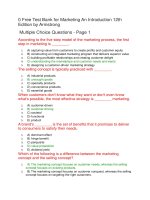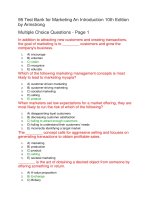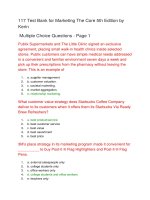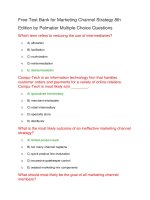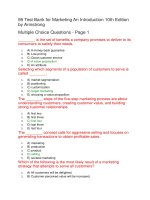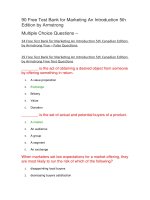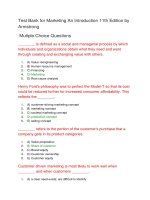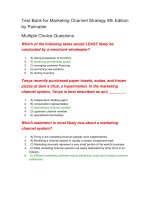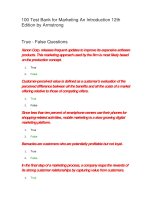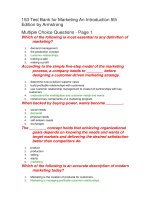Test bank for marketing channel strategy 8th edition by palmatier
Bạn đang xem bản rút gọn của tài liệu. Xem và tải ngay bản đầy đủ của tài liệu tại đây (76.08 KB, 16 trang )
Test Bank for Marketing Channel Strategy 8th Edition
by Palmatier
Multiple Choice Questions
Which of the following tasks would LEAST likely be conducted by a
merchant wholesaler?
1.
A) taking possession of inventory
2.
B) producing private-label goods
3.
C) arranging customer financing
4.
D) promoting new products
5.
E) storing inventory
Tanya recently purchased paper towels, sodas, and frozen pizzas at Sam’s
Club, a hypermarket. In the marketing channel system, Tanya is best
described as a(n) ________.
1.
A) independent retailing agent
2.
B) consumption representative
3.
C) downstream channel member
4.
D) upstream channel member
5.
E) specialized intermediary
Which statement is most likely true about a marketing channel system?
1.
A) Firms in the marketing channel typically work independently.
2.
B) Modifying a channel system is usually a simple, inexpensive task.
3.
C) Marketing channels represent a very small portion of the world’s business.
4.
D) Most marketing channel systems are easily duplicated by other firms in an
industry.
5.
E) Efficient marketing channels reduce distribution costs and increase customer
satisfaction.
Which of the following is LEAST likely a carrying cost associated with a
retailer taking title of a manufacturer’s products?
1.
A) storage
2.
B) breakage
3.
C) integration
4.
D) depreciation
5.
E) obsolescence
According to the text, what is a new trend taking place among retail
intermediaries?
1.
A) selling products directly to individual end-users
2.
B) selling products and services to businesses
3.
C) promoting products through catalogs
4.
D) selling products to wholesalers
5.
E) shipping products overseas
What risk does a branded manufacturer most likely face by allocating part
of its production capacity to private-label products?
1.
A) complicating the channel strategy
2.
B) creating a future competitor
3.
C) reducing licensing income
4.
D) losing customer trust
5.
E) depleting inventories
Katherine, a channel manager with a shoe manufacturer, recently learned
that prices in the channel are higher than desired by end-users. Katherine
most likely used a(n) ________ to determine this information.
1.
A) normative profit share
2.
B) gap analysis template
3.
C) segmentation grid
4.
D) efficiency template
5.
E) make-or-buy channel analysis
What should most likely be the goal of all marketing channel members?
1.
A) moving products to retailers
2.
B) expanding sales territories
3.
C) reducing distribution errors
4.
D) satisfying end-users
5.
E) promoting products
All of the following channel functions can move either upward or
downward in the marketing channel EXCEPT ________.
1.
A) information sharing
2.
B) negotiating
3.
C) financing
4.
D) risk taking
5.
E) ordering
Which of the following would be the best method for reducing channel
conflict?
1.
A) altering channel promotions
2.
B) expanding channel contacts
3.
C) applying channel power
4.
D) managing channel logistics
5.
E) restructuring the channel
Audrey works as a manufacturers’ representative for an athletic shoe
company. In her position, Audrey is most likely responsible for ________.
1.
A) generating marketing intelligence about the footwear industry
2.
B) taking physical possession of large quantities of shoes
3.
C) analyzing international markets for new shoe trends
4.
D) negotiating terms of trade with shoe retailers
5.
E) scheduling shoe deliveries and returns
Sony produces televisions and computers and sells them through
electronics stores. In a marketing channel, Sony would best be described
as a ________.
1.
A) trading company
2.
B) manufacturer
3.
C) wholesaler
4.
D) distributor
5.
E) retailer
Which of the following most likely occurs in the first stage of the
marketing channel strategy framework?
1.
A) comparing different channel structures and strategies
2.
B) segmenting the market based on end-users’ needs
3.
C) identifying best practices in channel structures
4.
D) examining potential channel conflicts
5.
E) developing policies and practices
The greatest number of contact lines most likely involves manufacturers
selling products ________.
1.
A) directly to retailers
2.
B) through one wholesaler
3.
C) directly to intermediaries
4.
D) through two wholesalers
5.
E) through three wholesalers
All of the following are key channel elements that must be managed to
ensure that a channel system runs smoothly EXCEPT ________.
1.
A) power
2.
B) conflict
3.
C) logistics
4.
D) segments
5.
E) relationships
A marketing channel strategy is a set of activities focused on designing
and managing a marketing channel for the purpose of ________.
1.
A) expanding a firm’s position in niche markets
2.
B) improving a firm’s sustainable competitive advantage
3.
C) minimizing difficulties with global distribution centers
4.
D) evaluating marketing expenses in order to find cost savings
5.
E) modifying the marketing mix to extend the product life cycle
Department stores, convenience stores, and warehouse clubs are best
categorized as ________.
1.
A) category killers
2.
B) product distributors
3.
C) retail intermediaries
4.
D) wholesale intermediaries
5.
E) specialized intermediaries
Which term refers to a set of independent organizations involved in the
process of making a product or service available for use or consumption?
1.
A) value chain
2.
B) supply chain
3.
C) marketing channel
4.
D) wholesale consortium
5.
E) multinational enterprise
Which channel function almost always moves up the channel from the
end-user to the producer?
1.
A) negotiation
2.
B) ownership
3.
C) financing
4.
D) payment
5.
E) risk
Manufacturers are LEAST likely to use intermediaries to:
1.
A) negotiate terms of trade
2.
B) manage production levels
3.
C) transport products to customers
4.
D) facilitate product orders and payments
5.
E) sell products directly to final consumers
Which term refers to reducing the use of intermediaries?
1.
A) allocation
2.
B) facilitation
3.
C) routinization
4.
D) reintermediation
5.
E) disintermediation
Compu-Tech is an information technology firm that handles customer
orders and payments for a variety of online retailers. Compu-Tech is most
likely a(n) ________.
1.
A) specialized intermediary
2.
B) merchant wholesaler
3.
C) retail intermediary
4.
D) specialty store
5.
E) distributor
The benchmarking stage of the marketing channel strategy framework
focuses on ________.
1.
A) establishing the power and dependence of channel members
2.
B) creating an environment for executing the best strategy
3.
C) identifying best practices in well-developed systems
4.
D) analyzing the needs of end-users and producers
5.
E) lowering channel system costs
How do intermediaries most likely create utility for end-users?
1.
A) negotiating financing terms with wholesalers
2.
B) ensuring product availability and assortment
3.
C) developing large stocks of similar products
4.
D) creating timely promotional materials
5.
E) offering convenient online tools
Which of the following indicates the proportional value added to the total
channel’s performance by each channel member?
1.
A) make-or-buy channel analysis
2.
B) segmentation analysis
3.
C) service outputs matrix
4.
D) gap analysis template
5.
E) normative profit share
Which term refers to splitting a market into groups of end-users?
1.
A) product promotion
2.
B) search facilitation
3.
C) channel integration
4.
D) segmentation
5.
E) routinization
Which factor would LEAST likely be considered in the implementation
stage of the marketing channel strategy framework?
1.
A) channel member power and dependence
2.
B) channel partner relationships
3.
C) end-user segmentation
4.
D) channel policies
5.
E) logistics
Which channel function almost always moves forward from the producer
to the consumer?
1.
A) negotiation
2.
B) promotion
3.
C) financing
4.
D) payment
5.
E) risk
A ________ is a channel member that takes the primary role of
establishing and maintaining channel links.
1.
A) channel intermediary
2.
B) wholesaler
3.
C) sub-processor
4.
D) gatekeeper
5.
E) channel captain
What general term refers to middle channel members in the marketing
channel?
1.
A) intermediaries
2.
B) manufacturers
3.
C) distributors
4.
D) brokers
5.
E) agents
Which channel function most likely plays a role in all value-added
activities of a marketing channel system?
1.
A) information sharing
2.
B) promotion
3.
C) negotiation
4.
D) payment
5.
E) ordering
Valu-Mart wants to ensure that its stores are never under- or overstocked
with certain products, such as paper towels, sodas, and cereal. Which tool
would most likely help Valu-Mart solve this problem?
1.
A) ROI
2.
B) CRP
3.
C) CRM
4.
D) OEM
5.
E) SWOT
ElectroInc produces cell phone accessories and sells them to firms such
as Apple and Samsung. Apple and Samsung put their own brand names
on ElectroInc products before selling them to end-users. Which term best
describes ElectroInc?
1.
A) retailer
2.
B) wholesaler
3.
C) branded manufacturer
4.
D) specialized manufacturer
5.
E) private-label manufacturer
Martin, a channel manager for an appliance manufacturer, needs to
evaluate the importance of each channel function in terms of cost and
value. Martin also needs to determine the proportion of each channel
function performed by each channel member. Which of the following
should Martin most likely use for this task?
1.
A) efficiency template
2.
B) cost-equity matrix
3.
C) normative profit metric
4.
D) segmentation grid
5.
E) gap analysis template
Which term refers to value-added services and products created by
channel members and consumed by end-users?
1.
A) wholesale bulk goods
2.
B) convenience products
3.
C) bundled services
4.
D) normative shares
5.
E) service outputs
What is the most likely outcome of an ineffective marketing channel
strategy?
1.
A) limited product reach
2.
B) too many channel captains
3.
C) quick product line maturation
4.
D) excessive gatekeeper control
5.
E) wasted marketing mix components
Which term refers to activities such as physically distributing products,
engaging in after-sales service, and handling customer payments?
1.
A) segmentation
2.
B) disintermediation
3.
C) channel strategies
4.
D) channel functions
5.
E) supply chain management
Which of the following is most likely an example of a firm engaging in
disintermediation?
1.
A) sorting products for suppliers
2.
B) selling products directly online
3.
C) reducing promotional activities
4.
D) scheduling product shipments
5.
E) replenishing inventory automatically
All of the following are sorting functions performed by intermediaries
EXCEPT ________.
1.
A) building up an assortment of products for resale purposes
2.
B) dividing stocks into smaller groups for easier handling
3.
C) combining similar products from multiple sources
4.
D) matching buyer product needs to retailer stocks
5.
E) sorting and grouping products that are similar
Which of the following is most likely a true statement about channel
functions?
1.
A) The order in which channel functions occur is the same for all industries and
products.
2.
B) All channel members must participate in every channel function to have full
efficiency.
3.
C) All channel functions move in a downward direction from the producer to the
end-user.
4.
D) Specialization tends to reduce marketing channel efficiency because of
increased members.
5.
E) The performance of certain channel functions correlates with other channel
functions.
True - False Questions
Channel captains are typically manufacturers of branded products.
1.
True
2.
False
Channel logistics relates to processing and tracking factory goods
throughout the marketing channel.
1.
True
2.
False
Specialization increases channel efficiency, but it also requires close
cooperation and coordination in channel operations.
1.
True
2.
False
In the context of a marketing channel, the relationship with an end-user is
considered finished once a product or service has been distributed.
1.
True
2.
False
Since intermediaries usually increase costs for producers and lower value
for consumers, a decentralized system of exchange is more efficient than
a centralized network.
1.
True
2.
False
Free Text Questions
Differentiate between the three general types of intermediaries.
Answer Given
There are three general types of intermediaries: wholesale, retail, and specialized.
Wholesalers include merchant wholesalers or distributors, manufacturers’
representatives, agents, and brokers. A wholesaler sells to other channel
intermediaries, such as retailers, or to business end-users, but not to individual
consumer end-users. Retail intermediaries come in many forms: department
stores, mass merchandisers, hypermarkets, specialty stores, category killers,
convenience stores, franchises, buying clubs, warehouse clubs, cataloguers, and
online retailers, to name just a few. Unlike purely wholesale intermediaries, they
sell directly to individual consumer end-users. Specialized intermediaries enter the
channel to perform a specific function; typically, they are not heavily involved in
the core business represented by the products being sold. For example,
insurance, financing, and credit card companies are all involved in financing;
advertising agencies participate in the channel’s promotion function; logistics and
shipping firms engage in physical possession; information technology firms may
participate in ordering or payment functions; and marketing research firms
generate marketing intelligence that can support the performance of many
functions.
Discuss the relationship between channel power and channel conflict.
What are the causes and effects of channel conflict?
Answer Given
In general, reducing channel conflict requires applying one or more sources of
channel power. A channel member’s power “is its ability to control the decision
variables in the marketing strategy of another member in a given channel at a
different level of distribution.” These sources could be used to further the
member’s individual ends or to influence channel members to perform the jobs
that the optimal channel design specifies are their responsibility. Incompatible
incentives can lead to channel conflict, generated when one channel member’s
actions prevent the channel from achieving its goals. Channel conflict might stem
from differences between channel members’ goals and objectives (goal conflict);
disagreements over the domain of action and responsibility in the channel (domain
conflict); or varying perceptions of the marketplace (perceptual conflict). Because
of the interdependence of all channel members, any one member’s actions exert
an influence on the success of the channel effort and thus can harm overall
channel performance.
How does the routinization of transactions benefit both buyers and
sellers?
Answer Given
Each purchase transaction involves ordering, determining the valuation of, and
paying for goods and services. The buyer and seller must agree on the amount,
mode, and timing of payment. These costs of distribution can be minimized if the
transactions are routinized; otherwise, every transaction would be subject to
bargaining, with an accompanying loss of efficiency. Routinization also leads to
the standardization of goods and services whose performance characteristics can
be easily compared and assessed. It encourages the production of items with
greater value. In short, routinization leads to efficiencies in the execution of
channel activities.
What are the nine universal channel functions? What direction does each
function move? Why do some channel functions move in both directions?
Answer Given
The marketing channel, through its members, performs a range of channel
functions that constitute a process, flowing through the channel that is performed
at different points in time by different channel members. Some functions move
forward through the channel (physical possession, ownership, and promotion);
others move up the channel from the end-user (ordering and payment); and still
other channel functions can move in either direction or reflect activities by pairs of
channel members (negotiation, financing, risk, information sharing). Some
functions, like information sharing, move in either direction. Manufacturers share
product and sales information with their distributors, independent sales
representatives, and retailers, which helps them perform the promotion function
better. Consumers provide their preference information to the channel, which
improves its ability to supply valued services.
What are service outputs? Why is it important for channel managers to
analyze the service output demands of market segments?
Answer Given
Service outputs are value-added services created by channel members and
consumed by end-users, together with the product purchased. Service outputs
include (but are not limited to) bulk breaking, spatial convenience, waiting and
delivery time, assortment and variety, customer service, and
product/market/usage information sharing. The same product can be demanded
by consumers whose demanded service outputs vary widely, resulting in very
different demands for the ultimate offering bundle, which comprises the product
plus service output. An analysis of service output demands by segment offers
important inputs into channel strategy designs, which can help increase the reach
and marketability of a product to multiple market segments.
